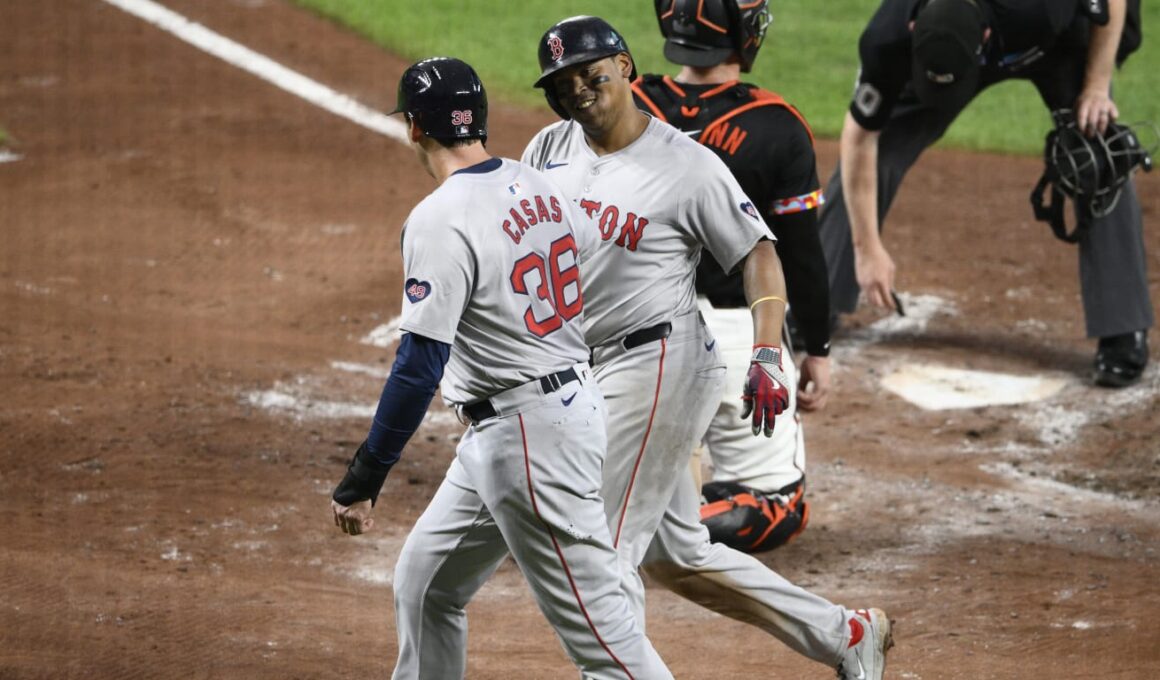Red Sox welcome Casas back with offensive eruption vs. O’s
BALTIMORE — Not only did the Red Sox get Triston Casas back on Friday night, but they got the good vibes that accompanied his return to action following a four-month absence.
Facing one of the best pitchers in the American League in Corbin Burnes, the Boston bats erupted early and often and tacked on after the big righty’s surprisingly short night (four innings) en route to a 12-10 victory over the Orioles at Camden Yards.
This is a win the Red Sox needed after losing six of their previous eight games, and 15 of their last 25 since the All-Star break.
The offensive pile-on was just as needed, given the struggles of the bullpen, which continued on Friday.
Kenley Jansen restored order to a wild slugfest when he fired a 1-2-3 ninth on just 12 pitches, carving up the heart of the dangerous Baltimore batting order for career save No. 443.
“I’ve seen a lot of these games. I’ve been in a lot of these games, and you just gotta slow it down mentally,” said Jansen. “You know that the momentum’s on both sides. It’s a crazy game, a high-scoring game. Everybody’s seeing the ball well. And for me, it’s just trying to mentally slow it down, and that’s what I did and got the 1-2-3.”
Five days after James Paxton went down – likely for the season – with a partial tear in his right calf, the Red Sox went with a bullpen game.
In the latest game of push-and-pull between Boston’s strong offense and slumping bullpen, the offense won out.
“Yeah, it’s unbelievable,” Jansen said of his team’s offense. “That just tells us we need to figure out how to pitch well down the stretch, and I think we should be fine. We know we have a pretty good offense, I know we all go through our tough times. I think when we all figure it out together as a team, we should be fine.”
Though Casas played just a small part offensively (1-for-5, 1 run), his teammates attacked the Orioles, led by big nights from Masataka Yoshida (3-for-4, HR, 4 RBIs), Jarren Duran (3-for-5, HR, 3 runs) and Rafael Devers (2-for-4, HR, 3 RBIs).
“I think there are certain guys that are going to benefit from having Triston in the lineup,” said Red Sox manager Alex Cora. “Raffy, hitting behind him, because Triston is going to see pitches and Raffy can do whatever he wants and be aggressive. Masa is going to benefit from those two at-bats, just watching them.”
Casas last played for the Red Sox on April 20, before being shut down with torn cartilage in his left rib cage. His return boosted a clubhouse that is trying to get on the other side of the dog days of August.
“Even when he doesn’t have a great day at the plate, he still has a knock,” said Duran of Casas. “His presence at the plate is amazing. And just having his presence back in the clubhouse is amazing.”
The left-handed-hitting slugger returned to the mix on a night the Sox won to keep pace with the Royals, who they trail by 2 1/2 games for the third American League Wild Card spot.
“Every game matters,” said Casas. “So I think we don’t know which one’s going to make the difference. I was trying to come back as soon as possible because every win matters just as much as the next one.”
Casas started a Minor League rehab assignment for Triple-A Worcester on July 30, during which he slashed .300/.404/.550 with one homer and seven RBIs over 11 games and 40 at-bats.
Cora recently said that it was up to Casas to decide when he was ready to return. What made Friday the day?
“Last night, after my first at-bat [in Worcester], something just popped in my head and told me I was ready to go,” Casas said. “Nothing more than that. Literally in the middle of the game, I told the trainers, ‘I’d be OK if this was my last game.’ So they were OK with that decision as well. And, you know, the process happened fast, and I was here a couple hours later.”
It wasn’t just a gut feeling. Casas, who is deeply analytical, used some available metrics to guide his decision on when to return.
“My bat speed numbers are back to where they were before,” Casas said. “That was what I was worried about the most — whipping the bat around at Major League speeds. And I’m right back to it. The pain is what it is. It’s not going to bother me from playing the game that I need to. And that’s what I wanted most.
“That was when I knew I was ready to come back was when I knew it wasn’t going to be a factor as to whether my result was based on an amount of discomfort. It was tolerable. It’s manageable. But it’s not going to be a reason why I don’t play well.”









